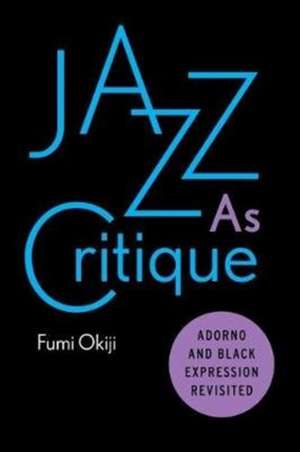Jazz As Critique – Adorno and Black Expression Revisited
Autor Fumi Okijien Limba Engleză Paperback – 3 sep 2018
| Toate formatele și edițiile | Preț | Express |
|---|---|---|
| Paperback (1) | 143.14 lei 3-5 săpt. | +17.08 lei 7-11 zile |
| MK – Stanford University Press – 3 sep 2018 | 143.14 lei 3-5 săpt. | +17.08 lei 7-11 zile |
| Hardback (1) | 556.14 lei 6-8 săpt. | |
| MK – Stanford University Press – 3 sep 2018 | 556.14 lei 6-8 săpt. |
Preț: 143.14 lei
Nou
Puncte Express: 215
Preț estimativ în valută:
27.39€ • 28.73$ • 22.80£
27.39€ • 28.73$ • 22.80£
Carte disponibilă
Livrare economică 11-25 martie
Livrare express 25 februarie-01 martie pentru 27.07 lei
Preluare comenzi: 021 569.72.76
Specificații
ISBN-13: 9781503605855
ISBN-10: 150360585X
Pagini: 160
Dimensiuni: 152 x 229 x 9 mm
Greutate: 0.23 kg
Editura: MK – Stanford University Press
ISBN-10: 150360585X
Pagini: 160
Dimensiuni: 152 x 229 x 9 mm
Greutate: 0.23 kg
Editura: MK – Stanford University Press
Cuprins
Notă biografică
Fumi Okiji is Assistant Professor of Women, Gender, Sexuality Studies at the University of Massachusetts, Amherst.
Descriere
Bringing critical theory to bear on music, this book argues that the jazz form models progressive social relations through its foregrounding of a "communal self," an African-American subjectivity that demands recognition of black humanity and alterity.





